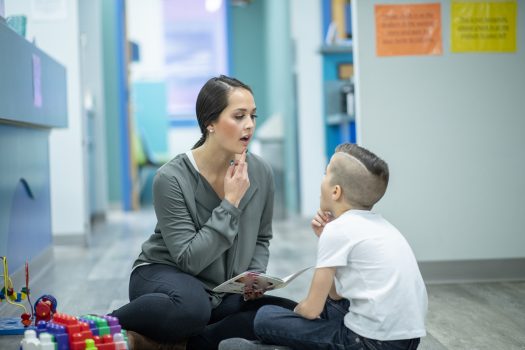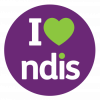
What is speech pathology, and how does speech therapy work to support my child? Four benefits of speech therapy for children
Speech pathologists, also commonly known as speech therapists, assess and treat communication and swallowing challenges in children.
The impact of their work can be life-changing because it can help prevent or reduce the lifelong consequences that often come with communication challenges.
From helping a child with autism spectrum disorder improve their social communication skills, to supporting a child with a receptive language disorder who struggles to follow instructions, or teaching non-verbal children to use augmentative and alternative communication (AAC) devices, speech pathologists play a vital role in empowering children to express themselves.
Importantly, speech pathologists also help parents and caregivers to develop the confidence to practice these newfound skills at home.
Below are four benefits of speech therapy that your child could experience.
1) Our Speech Pathologists are trained to work with children
When a child has a speech or language disorder, it can disrupt their ability to communicate and learn from others.
Speech pathologists are trained to help children of all ages to improve their ability to communicate. Working one-on-one with children, they can assist in skill development and in building the capacity of those caring for a child to support their child’s particular developmental needs.
Speech therapy exercises and activities for childhood speech development vary, but may involve interacting through talking and playing, using books and pictures to help stimulate language development, and modelling correct sounds and syllables for a child through age-appropriate play to teach the child how to make certain sounds. Treatment may also involve finding other means of communication, such as alternative communication devices.
To provide a holistic service, speech pathologists will often work alongside other professionals in the allied health industry, including occupational therapists, psychologists, and physiotherapists.
2) Childhood speech development can help with more than just speech problems
The benefits of speech therapy aren’t restricted to just speech. Speech pathologists are university-trained allied health professionals who work with anyone who has trouble communicating or swallowing to improve their quality of life.
They often have special interests in areas of complex needs, like deafness and hearing impairment, autism spectrum disorder, cerebral palsy, or intellectual disability.
At Ability Action Australia, our speech pathologists work in a multidisciplinary team with other health professionals to provide a holistic service and help people with a range of difficulties:
- Speech — saying the sounds in words
- Language — speaking and understanding others
- Voice — using the vocal cords to produce speech
- Fluency — stuttering and cluttering
- Literacy — reading and writing
Speech pathology for childhood speech development can provide support in many different ways. For example, a child with cerebral palsy may have difficulty controlling the muscles in their face, throat, neck, and head, which can lead to troubles with speech, chewing, and swallowing. While speech therapy is different for every child with cerebral palsy, therapy will aim to help improve a child’s speech and communication by strengthening the muscles used for speech, increasing oral motor skills, and improving their understanding of speech and language. It also can help with swallowing disorders like dysphagia.
A child with autism or Down syndrome who may need help with their receptive language can also be supported by a speech pathologist. Symptoms of receptive language disorder include not seeming to listen when they are spoken to, appearing to lack interest when storybooks are read to them, and difficulty understanding the meaning of words and sentences.
3) Speech therapy sessions can be relaxed and play-based
Speech therapy sessions create a comfortable and engaging space for children to work on their communication skills. Through interactive activities, games, and storytelling, children are encouraged to practice their speech and language in a way that feels natural and enjoyable. These sessions focus on important areas of speech development, such as clarity, vocabulary building, and forming sentences, helping children overcome communication challenges. By making play a part of therapy, children not only improve their speech but also build their confidence, social skills, and a strong foundation for lifelong communication.
4) Speech therapy can help assess and diagnose your child
Speech pathologists are trained over a period of four to five years in the diagnosis, management, and treatment of children who are unable to communicate effectively or who have difficulty with feeding and swallowing.
For babies, toddlers, and preschool/school-aged children, a visit to the speech pathologist is recommended in the following circumstances:
- They get frustrated trying to communicate
- They have difficulty understanding what is said to them or following instructions
- Their speech is hesitant or lacks fluency
- They’re non-verbal and don’t have functional communication
- They have difficulties with reading
- They struggle to use language in social interactions and understanding social rules
- They have a limited diet or difficulty chewing and swallowing food and fluids.
Children who are experiencing challenges communicating that participate in therapy before they go to school and who practice skills at home with the involvement of a parent or caregiver, tend to have better outcomes. Early intervention is key and often leads to more successful outcomes, allowing children to develop better language skills and improve their daily interactions and quality of life.
Benefits of Speech Therapy – Frequently Asked Questions
Does speech therapy work?
Yes, speech therapy can be highly effective for children, especially when tailored to their specific needs. It helps them develop or regain their communication skills by addressing issues such as articulation, fluency, voice disorders, and language comprehension difficulties. With the guidance of a trained speech therapist and targeted exercises, children can make significant progress in their speech, understanding, and overall communication abilities. Early intervention is key and often leads to more successful outcomes, allowing children to develop better language skills and improve their daily interactions and quality of life.
For children, what can a speech therapist help with?
A speech therapist can help children with a variety of communication challenges, including articulation disorders (trouble pronouncing sounds correctly), fluency issues (such as stuttering), and voice disorders (problems with pitch, volume, or quality of voice). They also assist with language difficulties, which can involve trouble understanding or using language appropriately. Additionally, speech therapists support children who have social communication disorders, helping them learn how to express themselves effectively and interact with others. By tailoring therapy to a child’s unique needs, they help improve overall speech, comprehension, and communication skills, enhancing confidence and daily interactions.
When to see a speech pathologist for a child?
You should consider seeing a speech pathologist for your child if you notice persistent issues with their speech or language development. This could include difficulty pronouncing words clearly, stuttering, a limited vocabulary for their age, trouble understanding instructions, or challenges in forming sentences. If your child struggles with social communication, such as taking turns in conversation or making appropriate eye contact, a speech pathologist can help. Early intervention is crucial, so if you have any concerns about your child’s speech or language skills, consulting with a speech pathologist sooner rather than later can lead to better outcomes.
What is the difference between a Speech Therapist and Speech Pathologist?
The terms speech therapist and speech pathologist are often used interchangeably and essentially refer to the same profession. Both roles involve professionals who are trained to diagnose and treat communication and swallowing disorders. They work with individuals to address issues such as articulation, language development, fluency, and voice problems. However, in some contexts, speech pathologist is considered a broader term that encompasses not only speech therapy but also the scientific study and comprehensive management of speech and language disorders. Despite this subtle distinction, both speech therapists and speech pathologists typically have the same qualifications and perform similar functions in clinical practice.
In summary
Ability Action Australia’s speech pathologists help children find ways to develop their ability to communicate. The benefits of speech therapy include:
- Speech pathologists are trained to help children of all ages improve their ability to communicate
- Delivering play-based speech therapy designed to engage a child in interactive speech and language development activities, including books, toys and creative play
- Our speech pathologists work in a multidisciplinary team with other health professionals to provide a holistic service and help people with a range of goals, not just communication
- Speech pathologists are trained over a period of four to five years in the diagnosis, management and treatment of children who are unable to communicate effectively or who have difficulty with feeding and swallowing
Talk to us
We can help your child progress with their NDIS goals and support you to feel more empowered to support their needs.
Whether you’re just getting started with an NDIS plan, evaluating your therapy options, or would like to know more about how we can help your child reach their goals, call us to speak to our friendly concierge team. Phone us on 1800 238 958 or email hello@abilityactionaustralia.com.au to find out more about childhood speech development.

